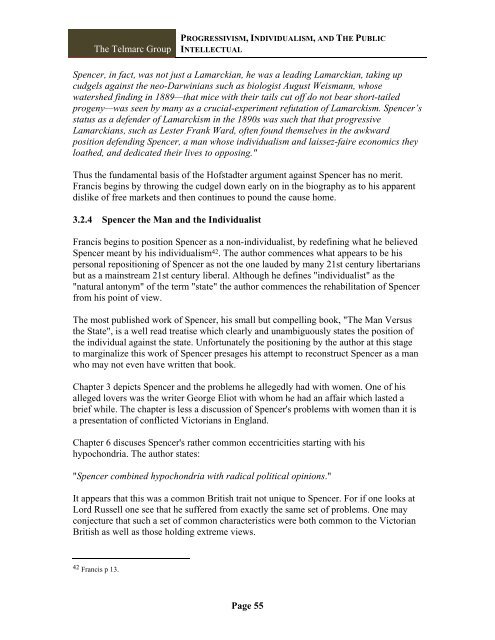progressivism, individualism, and the public ... - Telmarc Group
progressivism, individualism, and the public ... - Telmarc Group
progressivism, individualism, and the public ... - Telmarc Group
You also want an ePaper? Increase the reach of your titles
YUMPU automatically turns print PDFs into web optimized ePapers that Google loves.
The <strong>Telmarc</strong> <strong>Group</strong><br />
PROGRESSIVISM, INDIVIDUALISM, AND THE PUBLIC<br />
INTELLECTUAL<br />
Spencer, in fact, was not just a Lamarckian, he was a leading Lamarckian, taking up<br />
cudgels against <strong>the</strong> neo-Darwinians such as biologist August Weismann, whose<br />
watershed finding in 1889—that mice with <strong>the</strong>ir tails cut off do not bear short-tailed<br />
progeny—was seen by many as a crucial-experiment refutation of Lamarckism. Spencer’s<br />
status as a defender of Lamarckism in <strong>the</strong> 1890s was such that that progressive<br />
Lamarckians, such as Lester Frank Ward, often found <strong>the</strong>mselves in <strong>the</strong> awkward<br />
position defending Spencer, a man whose <strong>individualism</strong> <strong>and</strong> laissez-faire economics <strong>the</strong>y<br />
loa<strong>the</strong>d, <strong>and</strong> dedicated <strong>the</strong>ir lives to opposing."<br />
Thus <strong>the</strong> fundamental basis of <strong>the</strong> Hofstadter argument against Spencer has no merit.<br />
Francis begins by throwing <strong>the</strong> cudgel down early on in <strong>the</strong> biography as to his apparent<br />
dislike of free markets <strong>and</strong> <strong>the</strong>n continues to pound <strong>the</strong> cause home.<br />
3.2.4 Spencer <strong>the</strong> Man <strong>and</strong> <strong>the</strong> Individualist<br />
Francis begins to position Spencer as a non-individualist, by redefining what he believed<br />
Spencer meant by his <strong>individualism</strong> 42 . The author commences what appears to be his<br />
personal repositioning of Spencer as not <strong>the</strong> one lauded by many 21st century libertarians<br />
but as a mainstream 21st century liberal. Although he defines "individualist" as <strong>the</strong><br />
"natural antonym" of <strong>the</strong> term "state" <strong>the</strong> author commences <strong>the</strong> rehabilitation of Spencer<br />
from his point of view.<br />
The most published work of Spencer, his small but compelling book, "The Man Versus<br />
<strong>the</strong> State", is a well read treatise which clearly <strong>and</strong> unambiguously states <strong>the</strong> position of<br />
<strong>the</strong> individual against <strong>the</strong> state. Unfortunately <strong>the</strong> positioning by <strong>the</strong> author at this stage<br />
to marginalize this work of Spencer presages his attempt to reconstruct Spencer as a man<br />
who may not even have written that book.<br />
Chapter 3 depicts Spencer <strong>and</strong> <strong>the</strong> problems he allegedly had with women. One of his<br />
alleged lovers was <strong>the</strong> writer George Eliot with whom he had an affair which lasted a<br />
brief while. The chapter is less a discussion of Spencer's problems with women than it is<br />
a presentation of conflicted Victorians in Engl<strong>and</strong>.<br />
Chapter 6 discuses Spencer's ra<strong>the</strong>r common eccentricities starting with his<br />
hypochondria. The author states:<br />
"Spencer combined hypochondria with radical political opinions."<br />
It appears that this was a common British trait not unique to Spencer. For if one looks at<br />
Lord Russell one see that he suffered from exactly <strong>the</strong> same set of problems. One may<br />
conjecture that such a set of common characteristics were both common to <strong>the</strong> Victorian<br />
British as well as those holding extreme views.<br />
42 Francis p 13.<br />
Page 55












